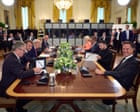The US president may be helping Putin to destroy the west, but his vanity is causing Europeans to speak with one voice on Ukraine
Seven is a biblical number, a number dear to ancient Rome, and the number of Cristiano Ronaldo’s lucky jersey. Perhaps it is also now going to be the answer to Henry Kissinger’s (probably apocryphal) question: what number do I call when I want to talk to Europe? Maybe the answer is seven, like the number of leaders sitting at the table in Washington on Monday alongside Donald Trump and Volodymyr Zelenskyy.
It’s difficult to say at this stage whether anything good will come from the impromptu White House summit, but European leaders showing up as a group in support of Ukraine was a first. This seven-member format – Nato, the European Commission, France, Germany, the UK, Italy and Finland – truly spoke with one voice. They did so on a crisis, Ukraine, over which they have sometimes been bitterly divided throughout the past three and a half years (remember Emmanuel Macron’s early concern not to “humiliate” Vladimir Putin?). Yet Ukraine is also the dossier over which European leaders have converged and yielded the greatest impact during the same timeframe: from the 18 sanctions packages the EU has imposed on Russia and the opening of EU accession negotiations for Ukraine, to the supply of weapons to Kyiv.
Fabrizio Tassinari is executive director of the School of Transnational Governance at the European University Institute in Florence



















